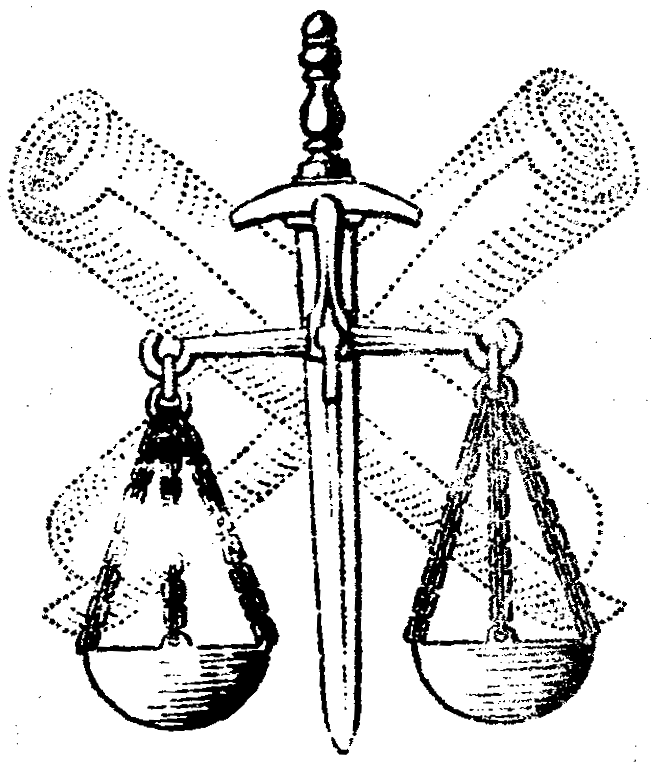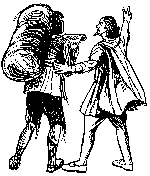
The Trial of Anne Askew
“And ye shall be brought before governors and kings for my sake, for a testimony against them and the Gentiles. But when they deliver you up, take no thought how or what ye shall speak. For it is not ye that speak, but the Spirit of your Father which speaketh in you” (Our Lord to His disciples; Matthew chapter 10, verses 18 to 20.)
Numerous are the martyrs of Jesus who have known the truth and the upholding of those words from Matthew's gospel spoken by our Lord to His disciples so many years ago. The names of Latimer and Ridley, or Hamilton and Wishart, immediately spring to mind as being of those who received “a mouth and wisdom” which all their adversaries were “not able to gainsay nor resist.” But, as all these were men who had proved themselves to be “able ministers of the word of God,” it is, perhaps, more especially in the “ordinary” member of the Church of Christ that we see the glory of this promise most vividly portrayed. Such is the case of Anne Askew, the twenty-five year old martyr of the gospel who was burnt at the stake in Smithfield Square in the year 1546, but who so astounded her accusers right up until the final hours of her death when she committed her soul into the hands of Him who had kept it throughout the weeks and months of her trial.
Anne Askew was born near Grimsby in the year 1521. Those were early days in the things of the Reformation, especially as far as our own islands were concerned, and John Calvin was still a schoolboy at Noyon in France. Anne married at an early age, but it soon became clear that it was an ill-matched marriage, and as her faith developed and increased, the gap between husband and wife widened until she was finally shut out from her home altogether, because her husband couldn't bear the stigma of being married to a woman of “protestant” sympathies. Right from the beginning it would seem that Anne Askew had been born to persecution as the sparks fly upwards, and soon she was forced to leave the region of her birth completely, first of all moving to Lincoln, and then London itself.
Ann was of that prophetic spirit of Amos that had heard the lion roar, and could do nothing else but speak. However to speak of the things of the gospel in those days was but to invite the wrath of the “church” and the state, and when Anne Askew made it known quite openly, “I had rather read five lines of the Bible than hear five masses,” the future course of her life was set, and in March 1545 she was formally accused of embracing the protestant heresy.
Now began the trials that were to last, on and off, over a year, and when all the official and theological might of the city of London was brought at various points in an effort to make this young “heretic” recant and re-enter the mother church of Rome. Listen to her here being interrogated by the Lord Mayor of the city, on the charge of denying the “reality” of the Mass:
Lord Mayor: Thou foolish woman, sayest thou that the priests cannot make the body of Christ?
Anne: I say so, my lord, for I have read that God made man; but that man made God I never yet read, nor, I suppose ever shall read.
Lord Mayor: No, thou foolish woman. After the words of consecration is it not the Lord's body?
Anne: No it is but consecrated bread, or sacramental bread.
Lord Mayor: What if a mouse eat it after the consecration? What will become of the mouse? What sayest thou, foolish woman?
Anne: What shall become of it, say you, my lord.
Lord Mayor: I say that that mouse is damned.
Anne: Alas, poor mouse!
This last reply finished the session for the court fell into laughter, and it was not thought advisable to continue! She was met with the old chestnut that she had no right to quote scripture at all, seeing that the apostle Paul had forbidden women to speak. But she very consistently pointed out that this injunction had to do with “teaching” the congregation, and as she had never entered a pulpit there was little that she could be charged with before the apostle.
The next opponent to enter the arena with the young saint was no less a person than the ill-famed Bishop Bonner himself. He tried to ensnare her with questions relating to the value of private Masses which were to be said for the souls of loved ones in purgatory. “What idolatry is this?” said Anne, “that we should rather believe in private masses than in the healthsome death of the dear Son of God!” Seeing that face-to-face confrontation was virtually useless, Bonner hit on a new plan of campaign. He produced a document which she simply had to sign as her confession of faith, and so, gain her release. She told him that she would sign the document provided that he added one sentence which would state that she believed those things written in it where they were in agreement with the Word of God. Needless to say, this was not what Bonner required; nor was he happy at a future date when she made her confession on paper in the following terms: – “I, Anne Askew, do believe all manner of things contained in the faith of the Catholic Church.” The Bishop well knew that Anne's “Catholic church” was very far different from the “Roman” Catholic Church.
There followed a short period of freedom from imprisonment, but when Anne was rearrested she was to face the most formidable opposition that she had yet encountered. But God abode faithful in giving her words to speak to the scattering of her foes. Bishop Gardiner attempted to play the fox, but ended up like one of those in Samson's escapade and had his tail burnt. He attempted to take Anne aside and speak to her in a private and fatherly manner. But Anne saw through the deception; “At the mouth of two or three witnesses every matter must stand after the doctrine of Christ and Paul,” she told him. “Then you must burn,” shouted the enraged Gardiner. “Search the scriptures,” was the young girl's reply, “and you will never find that Christ and His apostles put any creature to death. God will laugh your threatenings to scorn.”
Once again, the great issue of the Mass was raised, and with renewed vigour and courage Anne Askew delivered a scathing challenge to the assembled prelates; “As to that which you call your God,” she said, “it is a piece of bread. For proof of that, watch it any time you please, for if it lie in the box three months it will grow mouldy and so turn to nothing that is good. Whereupon I am persuaded that it cannot be God.”
The sentence of death soon came, and Anne was removed to the Tower of London to await the burning. During this time she was cruelly dealt with, as John Foxe gives testimony of in his famous Book of Martyrs; “First, she was led down into a dungeon,” he tells us, “where Sir Anthony Knevet, the lieutenant, commanded his jailor to pinch her with the rack; which being done as far as he thought sufficient, he was about to remove her, supposing that she had suffered enough. But Wriothesley, the Chancellor, displeased that she was so speedily released, when she would make no confession, commanded the lieutenant to bind her on the rack again. And when Knevet, less brutal than his superior, refused, and urged the weakness of the poor victim, the Chancellor threatened to report his disobedience to the King. Then he (the Chancellor) and Mr. Rich, throwing off their gowns, must needs play the tormentors themselves, first enquiring whether she were with child. To which she nobly answered 'Ye shall not need to spare for that, but do your will upon me.' And so, quietly and patiently praying unto the Lord, she abode their tyranny until her bones and joints were almost plucked asunder, so that she was carried away in a chair.”
It was only a matter of time now before the trial of Anne Askew would draw to a close on that July morning of 1546. There were three others led out to the stake along with her, but even up to the last, it was her words as given to her by the Lord that made ready testimony to her God and strengthened those others of like precious faith now about to die a like cruel death. The preacher for the occasion was Nicholas Shaxton – no doubt appointed to that task in a last-bid effort to weaken Anne Askew, and also as a means of torment to his own soul. Shaxton had been himself imprisoned for failing to comply with church strictures, but on hearing the sentence of burning being pronounced upon himself, he recanted, and signed the offending articles. No sooner had Shaxton ended his sermon over the martyrs than Anne was given a letter, written in the King's own hand, and offering her freedom if she would but follow the preacher Shaxton's example and recant. Her reply were the last words that fell from her mortal lips, “I came not hither to deny my Lord and Master.” And the flames were but a chariot of fire to bear her soul to its eternal rest.




